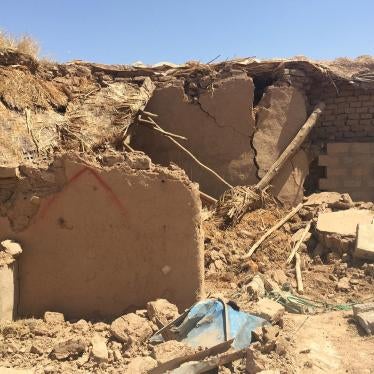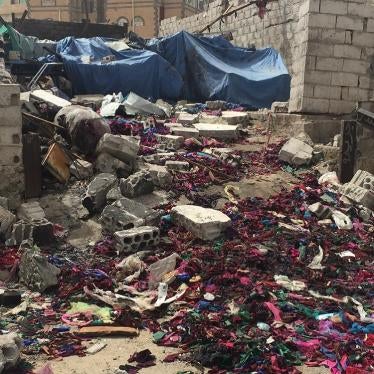(Tripoli) – Libya’s ruling National Transitional Council (NTC) should place an immediate moratorium on the exhumation of mass graves until forensic experts are available to support the exhumations, Human Rights Watch said today. Human Rights Watch said the NTC should also arrange security at known or suspected mass grave sites to prevent unauthorized exhumations.
“We understand that Libyans want to find the missing and give victims a dignified burial, but digging up graves without forensic experts present can destroy evidence and make it more difficult to identify the bodies,” said Peter Bouckaert, emergencies director at Human Rights Watch. “The focus for now should be on locating and securing the burial sites, and making plans for their proper exhumation.”
Since the collapse of the Gaddafi government in western Libya in late August 2011, mass graves containing the bodies of people killed during the conflict have been reported on a weekly basis in Tripoli and other areas, according to the International Committee of the Red Cross (ICRC). Based on available evidence, some of these people apparently died in government custody, including by execution. Human Rights Watch has documented apparent executions by Gaddafi forces in Tripoli, al-Qawalishand Bani Walid, and the suffocation deaths of 19 detainees in al-Khoms, some of which involved mass graves.
The grave sites documented to date vary in size, with some holding several dozen bodies. They also differ in the date of their creation, and some may contain remains from separate incidents. At one cemetery in Tripoli, a tractor driver told Human Rights Watch he had buried several hundred bodies gathered from various parts of the city during and after the fighting and brought to the site around August 20. Their identities and causes of death are unknown.
In addition to grave sites holding people killed during the six-month conflict, other sites relating to pre-conflict incidents are also at risk. These may include the graves of an estimated 1,200 prisoners killed in the Abu Salim prison massacre in 1996, whose remains were never returned to their families.
Exhumations began on many of the grave sites from the recent conflict as soon as they were located. Local authorities and groups typically conducted these exhumations without central coordination and at times without professional forensic assistance. The ICRC helped arrange the handling of 125 bodies from 12 different sites, but the organization is not involved in collecting evidence for possible use in legal proceedings. Where unplanned and unassisted exhumations have occurred, the opportunity to identify bodies and the circumstances of deaths may already be lost, Human Rights Watch said.
The NTC authorities have discussed plans to establish a commission on the missing. Human Rights Watch supports this plan and urges them to ensure that the commission is inclusive, consisting of representatives from key ministries such as justice, internal security, and health, in addition to forensic experts and lawyers. This breadth of expertise will be necessary for coordinating exhumations and identification of the remains of those killed during the conflict. Human Rights Watch urged the authorities to set up such a commission swiftly and empower it to begin its work with the establishment of all necessary laws and policies.
Human Rights Watch urged the United Nations and governments supporting the NTC to assist the commission by providing funds, technical equipment, and forensic experts where needed. The provision of foreign forensic experts should be done under the umbrella of the commission and should focus on both the collection of criminal evidence and the humanitarian identification of remains, so that the bodies can be returned to the families of the dead, Human Rights Watch said.
“In past post-conflict situations such as in Kosovo and Iraq, there was insufficient coordination with local authorities, and too many protocols used by different forensic teams,” said Bouckaert. “International assistance will be most effective if it bolsters national capacity.”





